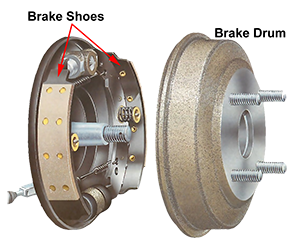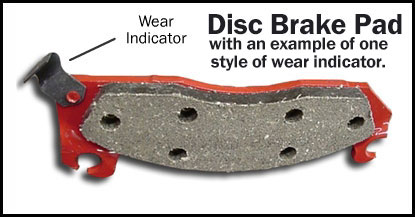
If your vehicles brakes are sounding like a screeching Banshee when you apply pressure to the pedal, then your vehicle is likely trying to tell you it's time to give your brakes some much needed attention.
Most cars today utilize a 4-wheel disc brake system but some vehicles on the road still use a combination of the drum brake style on the rear and disc on the front.
Here's a brief description of the differences between the two:
 Disc brakes use a rotor that is attached to the hub of the vehicle and brake calipers that hold a set of "pads" on the inside and outside of the rotor. When the brake pedal is pressed, hydraulic pressure pushes out pistons in the caliper causing brake pads to squeeze the rotating rotors making the vehicle slow down and stop.
Disc brakes use a rotor that is attached to the hub of the vehicle and brake calipers that hold a set of "pads" on the inside and outside of the rotor. When the brake pedal is pressed, hydraulic pressure pushes out pistons in the caliper causing brake pads to squeeze the rotating rotors making the vehicle slow down and stop.
 Drum brakes on the rear wheels utilize two curved "shoes" attached by springs to a backing plate behind the axel hub. When the brake pedal is pushed, hydraulic pressure pushes the shoes out against the inside of the hollow rotating brake drums (attached to the axel) to slow or stop the vehicle.
Drum brakes on the rear wheels utilize two curved "shoes" attached by springs to a backing plate behind the axel hub. When the brake pedal is pushed, hydraulic pressure pushes the shoes out against the inside of the hollow rotating brake drums (attached to the axel) to slow or stop the vehicle.
Disc Brakes
The most common type of brake squeak, screech or squeal is encountered after the vehicle has been parked over night and exposed to rain, dew, or high humidity where water has collected on the rotors. This causes a thin layer of rust to form on the surface of the rotors and as you drive off the next morning, the pads begin scraping off that layer of surface rust that gets embedded onto the pads and can cause the brakes to squeal. This is really no big deal and it typically goes away after a few miles of driving. If it doesn't, then something else is amiss!
Note: A vehicle that has been parked for a long period of time is different. Excessive rust build up can eat into the rotors causing significant imperfections on the surface that will transfer onto the brake pads. This can lead to a pulsating brake pedal, vibrations in the front end or a thumping noise when driving. The only suitable repair for this is to have the pads replaced and the rotors resurfaced if they still have sufficient thickness. If the rotors cannot be resurfaced, they will have to be replaced.
The second most common screech is caused by normal wear and tear and is the sound of a steel indicator, warning you that it is time to have the brakes serviced. Most sets of disc brake pads have a "wear indicator" attached to the inside pad that will make contact with the rotor before the pads are completely worn out. As the disc brake pads wear down, the wear indicator will come in contact with the rotor surface causing a screech or squeal indicating that the pads are getting thin and nearing the end of their service life and is time for the brakes to be serviced.
 Wear indicators vary in style and application based on different manufacturers preferences. All styles serve as an early warning that the pads are at the end of their service life and need to be replaced.
Wear indicators vary in style and application based on different manufacturers preferences. All styles serve as an early warning that the pads are at the end of their service life and need to be replaced.
Ignore this screech for too long and the pads will continue to wear down until you end up with metal on metal contact. When that happens, your screeching will turn into a horrible metallic grinding sound and that grinding can destroy the brake rotors. Keep ignoring it and it can potentially cause the vehicle to have a catastrophic braking failure. Do not ignore the early warning screech for too long! It will end up costing you more to repair if you do.
Note: It is always recommended to have the brake rotors resurfaced (if possible) or replaced if they are excessively worn. Failure to do this will result in uneven wear of new pads and screeching can quickly return.
Selecting the Right Disc Brake Pad
Pads today come in a variety of materials. These are based on different driving and braking needs.
The most common is the metallic brake pad. These normally contain bits of metal that are used for heat displacement from normal vehicle operation.
Be cautious here though! Some of the cheaper brake pads are manufactured with an overly high metal content. These pieces of metal drag on the rotor and can cause a high pitched brake squeak. Since your new brake pads are expected to last between 36,000 to 40,000 miles, you'll be listening to this annoying sound for months. Hopefully you'll never have to "slam" on the brakes, but if you do, quality parts can make the difference between squealing to a stop or having an accident.
Other options beyond the typical metallic pads include ceramic or synthetic brake pads. These tend to generate less brake dust (keep those shiny wheels shiny longer!) but can come with their own issues. Doing a little research before you need your brakes replaced will help you make the right decision for what pads work best for your needs and your vehicle.
Types of Brake Pad Materials - Pros and Cons from Autoanything.com
Drum Brakes
When it comes to drum brakes, the most common cause of screeching and squealing is worn out shoes. Other causes can be from improper adjustment or contact with the axel backing plate. Any screeching from drum brakes is a warning that there is significant problem and the only way to really determine the problem is to pull off the wheels and drums and have them serviced as soon as possible.
At the Mike Duman Auto Group, we provide high quality automotive repair services provided by our factory trained technicians for all of your automotive needs. We have two locations to serve you, Suffolk and Franklin. Our Service Departments are focused on one thing only...your complete satisfaction.
FYI
- Car brakes will often squeal when they are hot or under pressure.
- Mountain driving can often lead to squealing brakes.
- High-performance carbon-metallic brake pads are prone to squealing.
- All brakes will squeal from time to time. The time for concern is when it becomes a consistent squealing.
